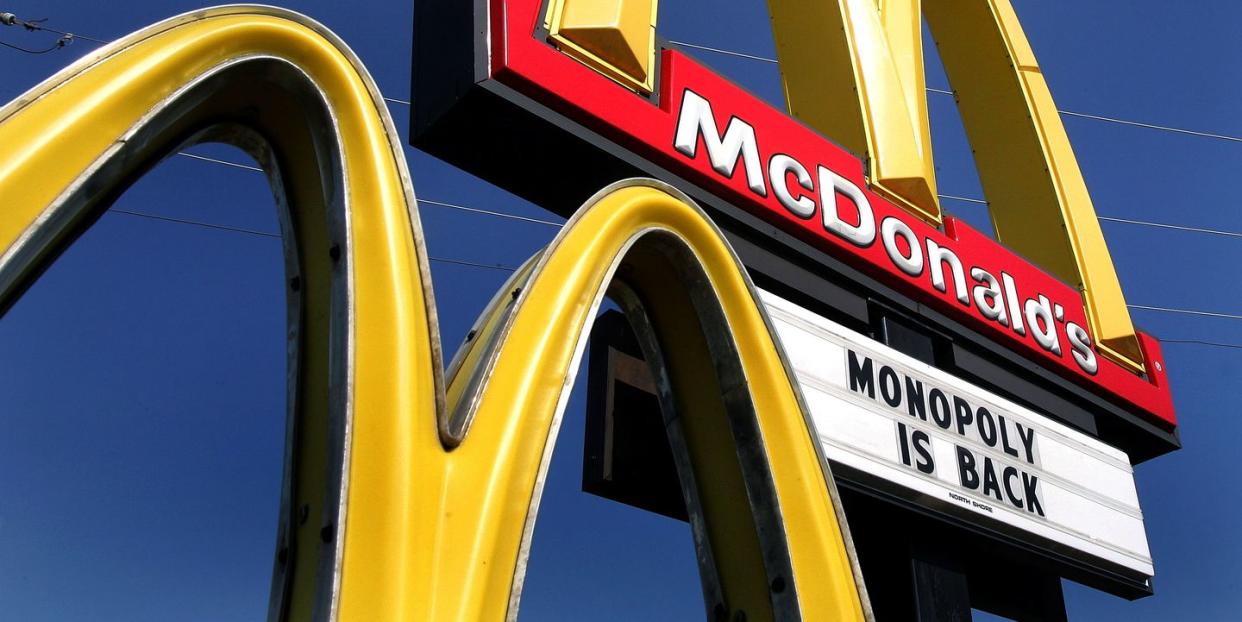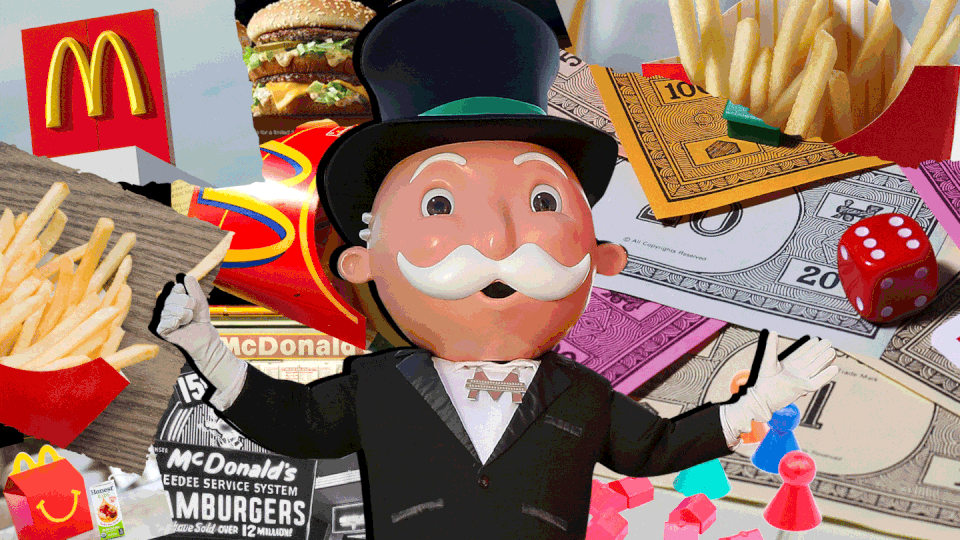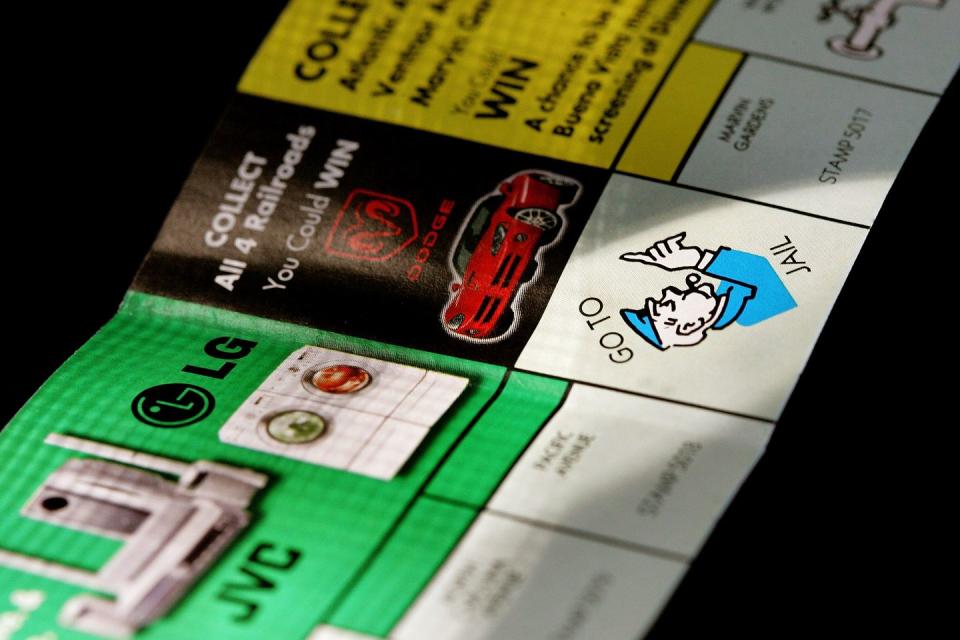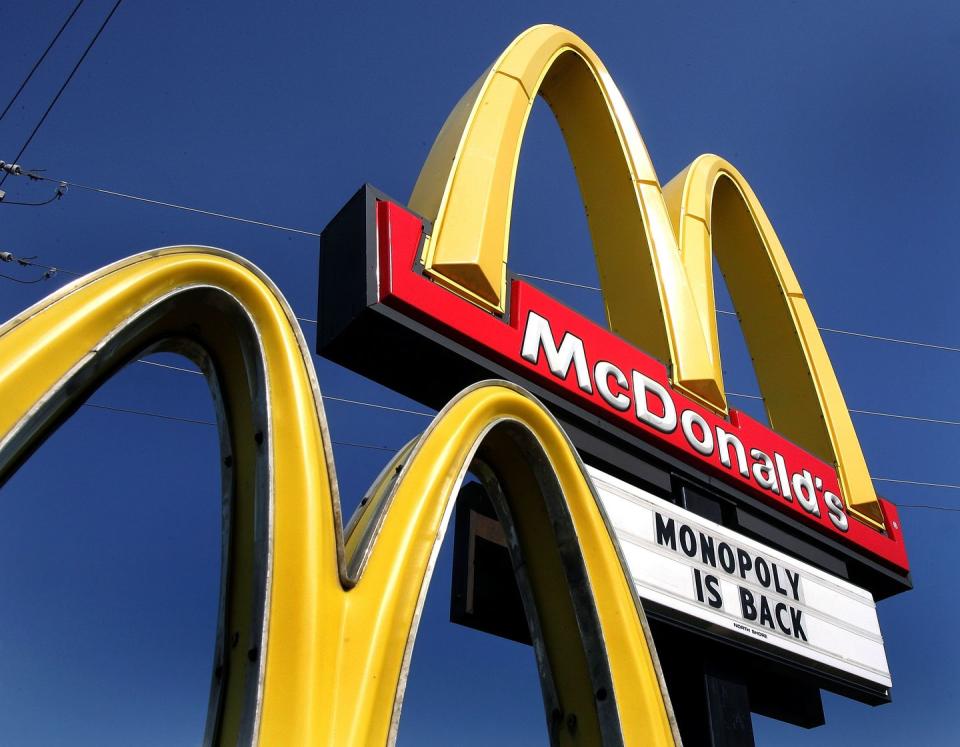So Can You Really Win A Fast Food Sweepstakes?


You can get a lot of things with a burger and fries—a drink, a kid's toy, a million-dollar Monopoly scam. That scam, executed by former police officer turned fraudster Jerome Jacobsen, is the focus of McMillions, HBO's new 6-part docuseries by executive producer Mark Wahlberg about how one man epically rigged McDonald's famous Monopoly contest. It's a sordid tale that sullied what was, in the '90s, the glory days of fast food.
The new doc delivers a follow-up to Daily Beast's account of the mess, which the site blasted to its readers nearly three years ago. TLDR: Jacobsen, at the time the head of security for the third-party marketing firm that printed McDonald's winning Monopoly pieces, stole said winning pieces, disseminating them to a network of people who'd give him a cut of the cash prize.
But how did we get here—a place where an ex-cop could, over the course of 12 years, hand friends and neighbors million dollar winning tickets from a hamburger joint? And how did we, and McDonald's, bounce back?
To get to a million dollars, you first have to go to an even more innovative promotion: the combo meal. The goal of McDonald’s, and restaurants like it, has always been to get more customers into their stores. “For companies to really stay profitable, they need their base to turn out,” says Adam Chandler, author of Drive-Thru Dreams. One of the first efforts was the “Triple Threat,” a burger, fry, and drink sold together as the first combo meal by Burger Chef, a now defunct Indianapolis-based burger joint that also pioneered the kid’s meal. The idea was to get customers out by “giving you the sense that you were getting a deal,” says Chandler. But while it started with food, it wasn’t long before companies realized that prizes, and even cash, could generate the same kind of buzz.
And as completion grew, so too did the give-outs and consumer cash-ins—but this didn’t always happen without incident. Ahead of the 1984 Olympics, McDonald’s launched a promotion promising free Big Macs, fries, and drinks when American Olympians medaled. There was only one issue: When the Soviets pulled out of the games that year in political protest, far more Americans medaled than the company anticipated, which meant they had to give away far more burgers. Some Mickey D's locations reportedly even ran out of the classic hamburger. “There have historically been times when companies took a huge bath on these huge promotions when they backfire spectacularly” says Chandler. And yet, companies often deemed that the buzz the promotions caused and the consumers they brought into stores were worth the continued risk. That's, in part, why McDonald's began their popular Monopoly game, where customers collected board game pieces for prizes like burgers, fries, cars, and even $1,000,000 in 1987.
When companies like McDonald's set out to create such promotions, they looked for things that could reach, and interest, the greatest number of their consumers. “Something like Monopoly—where its familiar to a consumer, they know what it is—there is a certain level of excitement, you know how it’s played, and it's fun,” says Chandler. Monopoly didn’t need any explaining, the game pieces were familiar, and in many ways, it was the perfect game for the era. According to Chandler, “It really is a reflection of the mainstream.”
In the '90s, with Wall Street soaring, Zubaz pants walking down the street, and the dot com craze making the whole country buzz, the idea that buying a carton of fries could earn you a Dodge Viper or a million bucks, well, that seemed right. The idea that Rich Uncle Pennybags, or more realistically, a massive multi-national corporation, could make you ultra-rich at random was more palatable. “It was sort of fun, we weren’t as critical,” says Chandler.
But we weren’t as primed to appreciate the irony of a massive company giving away a million dollars through an early twentieth century game with the premise of illuminating the pitfalls of greed and capitalism.

And sometimes, when you roll the dice, you land on “Go to Jail,” which is exactly what happened to Jerome Jacobson when his fraud ring was discovered by the FBI with help from McDonald's. When asked about the Monopoly scandal, a McDonald’s spokesperson said, “Nearly 20 years ago, the head of security at a third-party agency and a highly sophisticated criminal ring deceived and betrayed McDonald’s and its customers by stealing high-level game prizes in connection with various McDonald’s sweepstakes promotions. Our commitment then and still today is to our valued guests and maintaining their trust.”
Whether it was the chicken or the egg, the Monopoly scandal came at a time of transition for the fast food industry and the country as a whole. “Fast food was coming under fire culturally,” says Chandler. In addition to the scandal, films like Supersize Me and Fast Food Nation raised questions about the industry, popular opinion on the brands began to waiver, and a stacked deck against consumers in a promotion didn’t help. “The sense that everything is rigged against the consumer, there is an erosion of trust in large companies,” says Chandler.
McDonald’s did its part to try to alleviate the scandal, “Following an extensive FBI investigation and prosecution of the individuals responsible for the deception and crimes, McDonald’s took several actions including terminating the third-party vendor connected to the individuals responsible and giving customers the opportunity to win back every dollar that had been stolen through two subsequent giveaway promotions. We also created an independent promotions task force to develop and implement a new blue ribbon protocol for promotions that is still used today. Since this time, McDonald’s has successfully brought back numerous new promotions offering customers the chance to win millions of dollars in prizes,” said a spokesperson.
But the game had changed.

While some of those nationwide promotions and big prizes do still exist, many companies turned to more regional, smaller advertising, going back to prizes of burgers and Cokes rather than sports cars. It was harder to get burned. “The legacy of the Monopoly scandal is looking at how risk averse these companies have become—no one wants to be embarrassed,” says Chandler. And as the '90s ushered in the 2000s, great odds of winning a free burger became far more appealing than slim odds of a million-dollar dream. Localized promotions appeared at sporting events where a certain number of points or a strikeout led to a free taco or fries. Though, these did invite their own, far smaller, controversies, like fans booing their own team for failing to earn them a taco.
But even without the Monopoly scandal, it’s likely the fast food promotion world would still have undergone some of the same massive changes. Just like all other industries, fast food has had to figure out how to deal with changing media. The goal of their promotions has always been to reach the largest audience and get as many people into stores as possible, but large nationwide campaigns don’t grab the same number of eyes they once did. “It's inefficient to have a national campaign the way they used to. People aren’t consuming anything like they used to,” says Chandler. Going local helped accomplish more targeted advertising, but as the world has moved into the digital age, so too have our free burgers and fries.
It's far easier and more efficient for companies to target you on social media or convince you to use their app by promising a free sandwich, much like Chick-fil-A did a few months ago. But Chandler says the greatest reflection of the time we are in, and how companies promote themselves, was a teenager from Nevada named Carter Wilkerson who tweeted at Wendy’s "How many retweets for a year of free chicken nuggets?"
{# store twitter URL for regexes #}{% set twitterUrl = "https://twitter.com/carterjwm/status/849813577770778624" %}{# amp-twitter only supports status URLs #}{% set supported = twitterUrl matches '/\\/status\\//' %}{% if supported %}
{% endif %}
"They said 18 million, which was impossible," Chandler says. "It wasn’t a giveaway, it was a challenge. And it was stroke of genius." The post eventually went viral, and while Wilkerson didn’t get his 18 million retweets, he did get more than 3 million retweets, appearances on The Ellen Show, and untold free advertising for Wendy’s. And in the end, he got that year of free nuggets.
So fear not: The landscape has changed...but life-changing prizes are still out there.
You Might Also Like

